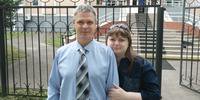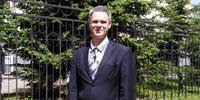Case of Gubin in Birobidzhan
Filter
- #
D. Yankin, a senior criminal investigator of the investigation department of the FSB of Russia for the Jewish Autonomous Region, initiates another criminal case for his faith under Part 2 of Article 282.2 of the Criminal Code of the Russian Federation - against 46-year-old Andrey Gubin. On the same day, I. Fedorov, a senior investigator of the FSB Investigation Department, opened a similar case against 55-year-old Oleg Postnikov. (A week earlier, on 06.02.2020, investigator D. Yankin opened 6 similar cases at once against 57-year-old Irina Lokhvitskaya, 26-year-old Anna Lokhvitskaya, 26-year-old Tatyana Sholner, 35-year-old Tatyana Zagulina, 40-year-old Anastasia Guzeva and 41-year-old Natalia Krieger. Even earlier, the husbands of Natalia Krieger, Tatyana Zagulina and Anastasia Guzeva - Valery Krieger, Dmitry Zagulin and Konstantin Guzev - became accused under similar articles. And Irina and Anna Lokhvitsky were prosecuted after their son and husband Artur Lokhvitsky. A total of 19 criminal cases were initiated against 22 believers in the city.)
- #
The first session in the Birobidzhan District Court of the Jewish Autonomous Region, chaired by Judge Yulia Viktorovna Tsykina. The defendant, Andrei Gubin, is filing six motions. The judge satisfies two of them: on additional acquaintance with the case and the preparation of the protocol and audio recording of court hearings in parts. The court does not accept Gubin's refusal of the defense counsel assigned to him. For the rest of the motions, the prosecutor will ask for time to prepare objections.
The next meeting is scheduled for October 13. The prosecutor will express his opinion on the motions of the defense.
- #
During the trial, the defendant Andrey Gubin thanks the prosecutor for the correct pronunciation of the name of God and voices his attitude to the charges: "There is religious discrimination based on someone's personal hostility, prejudice and illiterate understanding of the law on extremism. Extremism and terrorism contradict my inner beliefs, views and feelings. Thus, I consider this persecution to be a politically motivated order that contradicts logic and common sense."
The prosecutor voices objections to the petitions filed by the defendant. The court refuses to exclude the evidence of the prosecution, return the criminal case to the prosecutor and join the criminal cases.
The next meeting is scheduled for October 15. The prosecutor will begin presenting evidence.
- #
The prosecutor reads out the volumes of the criminal case containing transcripts of telephone conversations of believers. Andrey Gubin draws the court's attention to the fact that he did not participate in them.
Two prosecution witnesses are being questioned. They claim that they do not know the defendant. According to them, before the investigation, law enforcement officers told the witnesses that "the search will be for peaceful and calm people, so there is no need to take aggressive measures."
- #
Judge Yulia Tsykina watches videos of worship services, skipping significant episodes. The believer objected: "You are trying me for extremism, but how can you find calls for extremism through such squandering of evidence?" Further, the court reviews the video materials in full, including chants, prayers, speeches on spiritual topics. Gubin comments: "The doctrine of Jehovah's Witnesses is not extremist, and you could see this by listening to and watching videos of our meetings."
- #
The new prosecutor again provides the court with video recordings only partially.
- #
The court listens to recordings of telephone conversations of believers. Gubin notes that he is not among the participants in the conversation, and his phone number does not appear in these case materials.
- #
A defense witness, the defendant's former superior, is being interrogated. Earlier, representatives of law enforcement agencies forced him to dismiss Gubin without giving reasons. According to the witness, Gubin has always had a good reputation. When asked by the prosecutor whether the witness knows what religion Gubin professes, the interrogated replies that they have never talked about this topic. The court attaches all the positive characteristics of the believer.
- #
Andrey Gubin submits petitions to attach 16 written documents to the case file, on the basis of which he wants to show that there is no corpus delicti and that he did not take part in extremist activities.
The believer explains to the court that an attempt to ban the activities of Jehovah's Witnesses incites religious hatred in society towards ordinary believers. The facts presented at previous hearings, the studies of religious scholars, their conclusions, in the opinion of the defendant, refute the logic of accusations of extremism.
- #
The prosecutor requests a sentence of 4 years in prison and 2 years of restriction of freedom for Andrey Gubin. The prosecution claims that the believer used a prohibited translation of the Holy Scriptures, but the video recordings of the services do not confirm this. The prosecution also does not provide evidence of the existence of victims in the case.
- #
In the debate, the defendant and his lawyer speak. According to Andrey Gubin, the prosecution mistakenly qualified the lawful behavior of the believer as criminal activity. He stresses that he did not disseminate ideas related to any discrimination against others, did not harm anyone. His participation in worship services and his religious beliefs were and are exclusively peaceful in nature and have nothing to do with extremism, the believer emphasizes. He also refers to a number of documents submitted by the Russian Federation to international bodies, according to which the teachings of Jehovah's Witnesses are not prohibited in Russia. "The illegality of my actions during the judicial investigation was not proven," the defendant declares.
The believer plans to deliver his last word in court on September 8.
- #
The last word of the defendant Andrey Gubin in Birobidzhan - #
Yulia Tsykina, judge of the Birobidzhan District Court of the Jewish Autonomous Region, finds Andrey Gubin guilty and sentences him to 2 years and 6 months of probation, 2 years of probation and 1 year of restriction of freedom for reading the Bible.
- #
The believer reads out the petition for an open hearing, but it is rejected, referring to the practice of the district court. The hearing at the Court of the Jewish Autonomous Region is held behind closed doors.
Judge Irina Zhurova reads out the complaint, after which the parties are given the floor. The prosecutor points out that the believers, despite the ban, continued to comply with the provisions of the charter of the LRO. Gubin objected, noting that the court did not consider the charter of the LRO and did not prohibit the worship of God. According to the believer, the court of first instance drew attention to the fact that even former members of the LRO can continue to profess their faith and gather together to worship God. Gubin then delivers his last word.
The Court of Appeal shall uphold the decision of the lower court. The verdict comes into force.
- #

